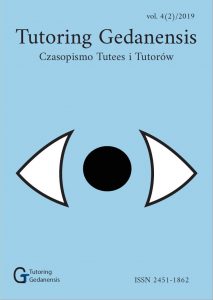Czy immunoterapia punktów kontrolnych jest przyszłością onkomedycyny? Rozważania tutoringowe
Słowa kluczowe:
immunosupresja, immunoterapia, PD-1/PD-L1, CTLA-4, mikrośrodowisko nowotworuDownloads
Bibliografia
Adams S., Schmid P., Rugo H. S., Winer E. P., Loirat D., Awada A., Cescon C. W., Iwata H., Campone M. Nanda R., 2019. Pembrolizumab monotherapy for previously treated metastatic triple-negative breast cancer: cohort A of the phase II KEYNOTE-086 study. Annals of Oncology, 30 (3), 397-404.
Beatty G.L., Gladney W. L., 2015. Immune escape mechanisms as a guide for cancer immunotherapy. Clinical Cancer Research, 21 (4), 687-692.
Chmielewska I., Szczyrek M., Wojas-Krawczyk K., Grzywna A., Milnowski J., Krawczyk P., 2018. Wpływ mikroflory jelitowej na skuteczność immunoterapii z wykorzystaniem przeciwciał przeciwko immunologicznym punktom kontroli – opis przypadku i przegląd literatury. Onkologia w Praktyce Klinicznej – Edukacja, 4, 275-281.
Farhood B., Najafi M., Mortezaee K., 2019. CD8+ cytotoxic T lymphocytes in cancer immunotherapy: A review. Journal of Cellular Physiolog y, 234 (6), 8509-8521.
Fecher L. A., Agarwala S. S., Hodi F. S., Weber J. S., 2013. Ipilimumab and Its Toxicities: A Multidisciplinary Approach. The Oncologist, 18 (6), 733-743.
Gong J., Le T., Massarelli E., Hendifar A.E., Tuli R., 2018. Radiationtherapy and PD-1/PD-L1 blockade: the clinical development of an evolving anticancer combination. Journal for ImmunoTherapy of Cancer, 6, 46-63.
Joyce J. A., FeaPanron D. T., 2015. T cell exclusion, immune privilege, and the tumor microenvironment. Science, 348 (6230), 74-80.
Knopik-Skrocka A., Kręplewska P., Jarmołowska-Jurczyszyn D., 2017. Tumor blood vessels and vasculogenic mimicry – current knowledge and searching for new cellular/molecular targets of anti-angiogenic therapy. Advances in Cell Biolog y, 5 (1), 50-71.
Lang B. M., Peveling-Oberhag A., Faidt D., Hotker A. M., WeyerElberich V., Grabbe S., Loquai C., 2018. Long-term survival with modern therapeutic agents against metastatic melanoma- -vemurafenib and ipilimumab in a daily life setting. Medical Oncology, 35 (3).
Leach D. R., Krummel M. F., Allisson J. P., 1996. Enhancement of antitumor immunity by CTLA-4 blockade. Science, 271 (5256), 1734-1736.
Long L., Zhang X., Chen F., Pan Q., Phiphatwatchara P., Zeng Y., Chen H., 2018. The promising immune checkpoint LAG3: from tumor microenvironment to cancer immunotherapy. Genes & Cancer, 9, 176-189.
Mansh M., 2011. Ipilimumab and cancer immunotherapy: a new hope for advanced stage melanoma. Yale Journal of Biolog y and Medicine, 84, 381-389.
Modrzyński T., Gwit M., Knopik-Skrocka A., 2019. Check points inhibitors – a future of immunotherapy in oncomedicine? Tutoring reflections. Vth International Conference on Research and Education, April 2019, Abstracts, p.76.
Nathan M. R., Szmid P., 2018. The merging world of breast cancer immunotherapy. The Breast, 37, 200-206.
Oiseth S. J., Aziz M. S., 2017. Cancer immunotherapy: a brief re view of the history, possibilities, and challenges ahead. Journal of Cancer Metastasis and Treatment, 3, 250-261.
Ozpiskin O. M., Zhang L., Li J. J., 2019. Immune targets in the tumor microenvironment treated by radiotherapy. Theranostics, 9 (5), 1215-1231.
Piórek A., Zaborowska-Szmit M., 2017. Atezolizumab – inhibitor PD-L1 w niedrobnokomórkowym raku płuc. Onkologia w Praktyce Klinicznej, 13, 211-215.
Raniszewska A., Polubiec-Kownacka M., Rutkowska E., Domagała-Kul-awik., 2019. PD-L1 expression on lung cancer stem cells in metastatic lymph nodes aspirates. Stem Cell Reviews and Reports, 15 (2), 324-330.
Routy B., Chatelier E., Derosa L., 2018. Gut microbiome influences efficacy of PD-1-based immunotherapy against epithelial tumors. Science, 359 (6371), 91-97.
Sultan M., Coyle KM., Vidovic D., Thomas M., Gujar S., Marcato P., 2017. Hide-and-seek: the interplay between cancer stem cells and the immune system. Carcinogenesis, 38 (2), 107-118.
Swatler J., Kozłowska E., 2016. Immunoterapie nowotworów działające na punkty kontrolne układu odpornościowego. Postępy Higieny i Medycyny Doświadczalnej, 70, 25-42.
Umansky V., Blattner C., Gebhardt C., Utikal J., 2016. The Role of Myeloid-Derived Suppressor Cells in Cancer Progression. Vaccines, 4 (4), 36.
Wu J., Lanier L. L., 2003. Natural killer cells and cancer. Advances in Cancer Research, 90, 127-156.
http://onkologia.org.pl/wp-content/uploads/Prognozy_2025. pdf [Dostęp 29.04.2019]
www.stream.wum.edu.pl/pl/baza-wiedzy/70-immunoterapia- -nowotworow [Dostęp: 29.04.2019]
www.ncbi.nlm.nih.gov/pubmed [Dostęp 29.04.2019]
www.stream.wum.edu.pl/pl/baza-wiedzy/172-blokada-punktow-kontrolnych-ukladu-odpornosciowego-czesc-i [Dostęp: 29.04. 2019]
www.cancerresearch.org/immunotherapy/timeline-of-progress [Dostęp: 29.04.2019]
www.clinicaltrials.gov/ct2/show/NCT01968109 [Dostęp: 29.04.2019]

 Uniwersyteckie Czasopisma Naukowe
Uniwersyteckie Czasopisma Naukowe



